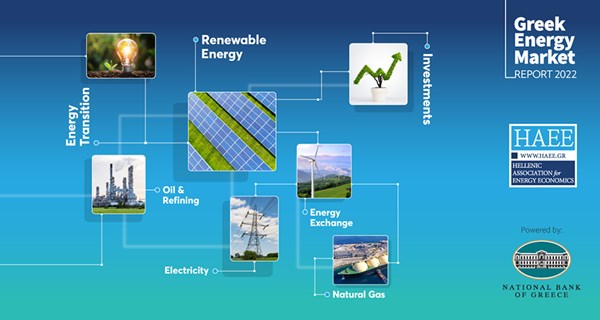For the fourth consecutive year, the Hellenic Association for Energy Economics (HAEE) is proud to present the Greek Energy Market Report 2022, powered by the National Bank of Greece. The Greek Energy Market Report 2022, through its continuity and systematic approach, attempts to capture all the key facts and figures of the energy market spectrum, stimulate and support discussions across the board and ultimately contribute to the advancement of the Energy Sector in Greece. 2021 was a year of remarkable growth, after the pandemic-hit 2020, creating a context of opportunities and hope, but also significant challenges, contradictions, and uncertainty. The year was characterized by landmark policy documents, such as EU’s Fit-For-55, central support initiatives, such as the EU/National Recovery and Resilience Facility, but also inflated prices and significant supply chain issues across the energy sector and economic activity in general. The RES and hydroelectric share in Greece’s energy mix surpassed that of fossil fuels for the first time, with a record RES contribution in May (63%) and a record wind contribution in September (48%). At the same time, and even without considering the recent geopolitical turmoil, the mean electricity wholesale price skyrocketed to 240€/MWh during 2021, which, in combination with the high natural gas and CO2 prices, at 90€/MWh and 80€/tn respectively, created an entirely new reality in the sector, calling for targeted short- and long-term measures and actions. In 2021, strong volatility is noticed when comparing electricity prices between Q1 and Q4 in most European countries. Particularly, electricity prices in Greece recorded historical highs during the second half of 2021. Household natural gas prices followed the same trend and tripled during the period 2021-2022, reaching their highest at 11.08€/MWh in January 2022. It is expected that because of the ongoing Russia-Ukraine war, natural gas prices will further increase, mainly due to potential Russian sanctions and low storage levels. The decarbonization process of electricity generation in Greece continues, with the lignite energy technologies capacity share dropping to 12% in January 2022. Despite this drop, the lignite phase-out will be postponed from 2025 to 2028 as a measure to reduce dependency on natural gas imports. Significant progress is being made in the renewable energy sector. Last year 1.5 GW of new green projects were added to the market, from the 7.7 GW that is the national target for the decade to 2030, meaning that 20% of it has already been covered. Moreover, by 2025, 3GW are planned to be added to the system investments in renewable projects and technologies are expected to thrive, and the NECP target of the share of RES will be significantly extended. Greece has a unique opportunity to expand its adoption and utilization of RES and accelerate its energy transition, through an abundance of financing tools (e.g., RRF, Just Transition, ESPA). Nevertheless, the broader transformation of the wholesale market and the expansion of Power Purchase Agreements (PPAs) is also critical for the development of the respective infrastructure. Investors’ interest in RES is a given and in a trajectory of growth, expanding also to newer technologies, such as offshore wind and hydrogen. A prerequisite for the above interest to materialize, however, is the presence of a coherent and technology-specific regulatory framework, that would generate confidence to investors and minimize bureaucracy and licensing timeframes. Since early 2022, the world is shaken by the Russia-Ukraine war and its unprecedented repercussions on the energy market. Due to the high impact of this crisis on the energy market, this Report includes an analysis up to April 2022, upon availability of data. HAEE is constantly collating, analyzing and distilling the energy market developments, aspiring to be an objective source of information and insights, supporting an open dialogue and informed decisions in the energy sector. To find out more, download the full report here.
|



